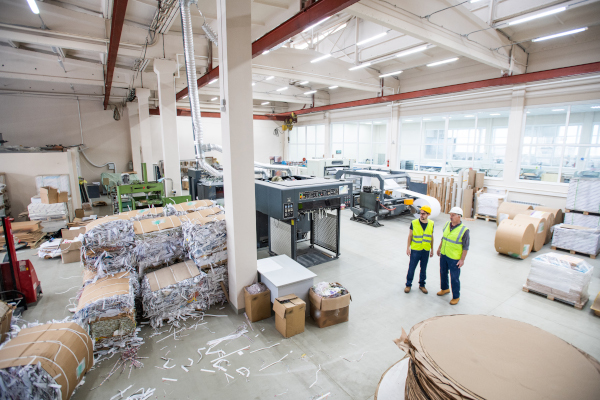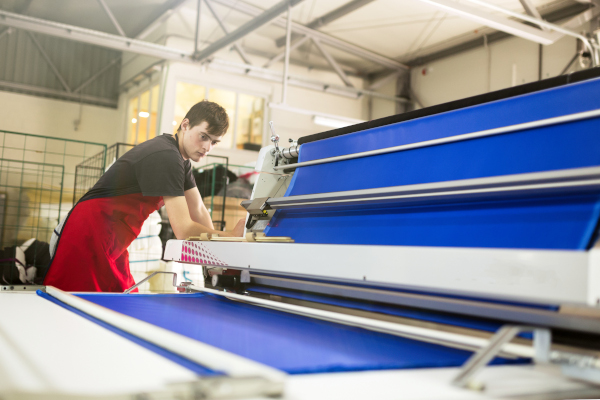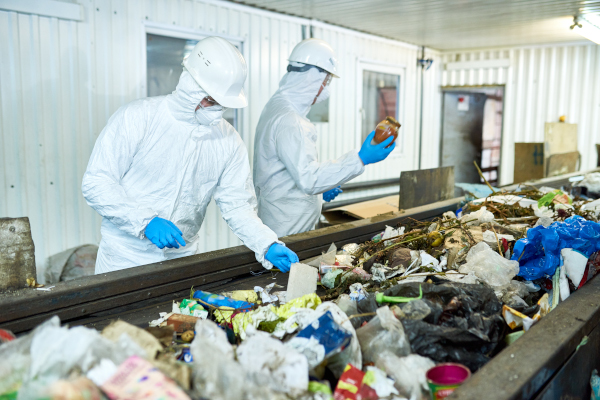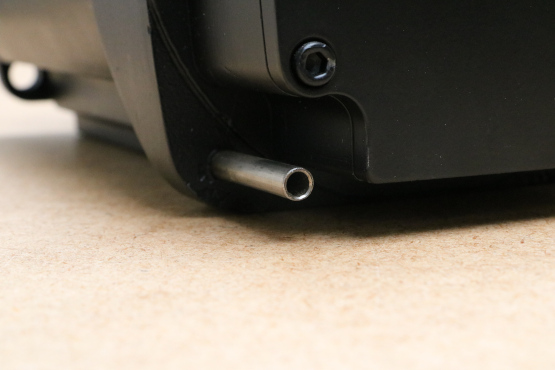Low-maintenance drive technology for difficult production conditions - Concepts for servo motors and servo converters
Read min.

Your customers want to avoid downtimes and high maintenance costs on their machines?
Despite aggressive environmental conditions? Cost-effectively and with little effort?►Get your free webcast now
They have to take a lot: Motors and converters in production are exposed to dirt, dust and heat. And nonetheless work forever.
Index
- Aggressive ambient conditions: These industries are the worst affected
- Contaminated air:
- Heat:
- Heat and contaminated air:
- Mechanical loads:
- What can be done?
- The solution: Liquid cooling with water or oil
- Twice the performance with the same dimensions with liquid-cooled motors
- The advantages at a glance
- Do you have anymore questions?
Maximum performance 24/7 despite heat, dust exposure and dirt. Electrical drive systems can only withstand such conditions if the components are appropriately prepared.
Aggressive ambient conditions are everyday reality in production buildings round the globe. Mechanical engineers try to fulfill fail-safe requirements by specifying operating conditions for their machines. But reality differs in most cases. The conditions cannot be met, the drive technology fails and expensive failures occur. This article not only summarizes the causes and their specific consequences but also points out ways in which drive systems can be made more robust and therefore prevent downtimes..
Aggressive ambient conditions: These industries are the worst affected
Plastics industry machines such as injection casting machines, extruders and blow molding machines | Machines for diecast aluminum or recycling technology | Web-processing machines such as tubular bag or cutting and punching machines as well as crosscuttters | Textile machines such as Jacquard machines | Machines for the food or packaging industry

In the paper industry, fabric fibers in the air block the ventilation filters and dirty the drive components

In the textile industry, textile fibers in the air block the ventilation filters and deposit on the components
Contaminated air:
Fabric fibers in the textile and paper industry, corrosive dust in the metal industry, dirt particles in the plastics industry and in recycling. All this leads to deposits in fans and control cabinets and thus reaches the active parts of electric motors and in the housings of motors and electronics.
The consequences are often fatal. Good, if only minor problems occur: for example, deposits on the rotor, which lead to unbalance and increased noise. Overheating of the components is significantly more serious. The reason is dirtied air filters, which prevent cooling or other barriers that prevent the flow of cooling air. The performance of the components suffers initially and they finally fail.
Contaminants with corrosive properties make insulation systems in the motor age prematurely and lead to a short-circuit; here, the drive system and thus the plant also fail completely.
These problems lead to an inordinate amount of maintenance work. Ventilation filters must be replaced frequently, components cleaned regularly. This leads to unscheduled downtimes.

Drives in the recycling industry are exposed to dust and dirt
The difficult diecast aluminum environment also has an extreme impact on all the machine’s components. It is hot, dusty and the necessary parting compounds, which prevent the component from adhering to the die, including conductive particles, settle on components.
Heat:
Friend to some and foe to others. High dynamic forces lead to high productivity and the machine operator is pleased. However, the high requirements of dynamic systems with abrupt start-stop movements, for example those in injection casting machines and blow-molding machines, have an enormous impact on the drives and can contribute to large heat generation. If, for example, the plant is also located in India, where the maximum temperatures by day reach 50 degrees Celsius, then the situation becomes really tricky.
The consequences are initially losses in performance and in the worst case machine failures. Air-conditioning units are then installed in the control cabinet to protect the servo converters from overheating. However, the active cooling causes an extremely high energy consumption and therefore high costs.
Heat and contaminated air:
If both factors play a role at the same time, that is to say heat with simultaneously contaminated air, then the situation becomes twice as complicated. The temperature problem can then no longer be controlled easily with fans and air-conditioning units. This is because these then draw in the contaminated air, which in turn has to be cleaned by filter mats. The filter mats block quickly, which reduces the cooling capacity. The cleaning of the filter results in additional maintenance costs, operation of the air-conditioning units drives up energy costs. The fans also additionally swirl up the dirt present, which is particularly undesirable in the food and pharmaceuticals industry.
Mechanical loads:
Apart from the named ambient conditions, mechanical loads in the form of vibration and shocks often also play a role in machine failures. You can find detailed information on this problem in our article:
Motor damage due to vibration or shocks? It doesn't have to be like this.
What can be done?
Contaminated air must be kept out of the system: Fans that draw in dirt or additionally swirl it up must be avoided, control cabinets and components must be encapsulated wherever possible.

Air cooling is not a solution, particularly in high ambient temperatures, because the cooling effect is nowhere near sufficient. The more dynamic the processes are, the greater the heat generated at the load peaks. At the same time, from 40 degrees Celsius ambient temperature, derating, i.e. loss of performance, occurs due to the heat.
The efficiency of electric motors is above 90 percent, which is very good. However, the remaining 10 percent cannot be converted into movement and is output in the form of heat. This means functioning cooling is required for continuous performance. However, the ambient air is not suitable for this.
Conclusion: Air must not play a role in the cooling => another cooling medium must be used.
The solution: Liquid cooling with water or oil
Both the electric motors and the electronics made by Baumüller can be equipped with liquid cooling. In the electric motor, a cooling medium that removes the heat is fed through cooling lines in the stator. . Converters are equipped with a direct, liquid-cooled heatsink. Potential cooling media include oil or water. Water has a higher heat capacity and thus offers higher cooling capacity with the same flow. Oil is mostly preferred if the machine already has an oil circuit, for example, for hydraulic components. Fans and air-conditioning units for the control cabinets are thus not necessary, instead a cooling unit is required, which cools the cooling medium to the necessary temperature. This unit does not necessarily have to be located in the production building and can therefore be positioned in a sensible location away from the dust and heat. A further advantage is that liquid cooling is a closed system. The cooling therefore functions regardless of the ambient conditions. Motors and control cabinets can be encapsulated and thus protected against dust, airborne particulates, fumes and vapor. The cooling prevents the input of dirt into the drive system.
Twice the performance with the same dimensions with liquid-cooled motors
Liquid cooling removes heat losses produced better than fan cooling. Due to the improved cooling capacity the motor performance is up to 50 % better than uncooled motors with the same type of construction. This means that in many cases the motors can be smaller in dimensions. Smaller motors have a lower inertia and thus enable higher dynamics. These properties of water-cooled motors with respect to dynamics make it possible to reduce cycle times and increase the productivity of machines. More compact motors without additional fans also reduce the machine footprint. The fact that the cooling in the electric motors takes place directly also has an effect on occupational safety. The lost heat does not reach the surface of the motor, but instead is removed internally by the cooling liquid in the stator. The system therefore requires fewer precautions as protection against contact. There are also fewer risks due to materials decomposing on hot surfaces. For example, heated PVC gives off hydrochloric acid fumes and other hazardous substances.

Dust-free and heat resistant: The cooling lines of liquid-cooled motors are directly in the motor housing and so the motors function as an encapsulated system
Get your Webcast now!
Detailed information on the topic of liquid-cooled electric motors with FAQs can be found here:
The advantages at a glance
-
Maintenance costs are reduced (e.g. filter cleaning)
-
Downtimes are avoided
-
Energy consumption is reduced (e.g. for control cabinet cooling)
-
Better cost-benefit ratio: thanks to the improved motor cooling, smaller size motors can be used
-
Higher dynamics and therefore greater productivity is possible
-
Smaller footprint
-
More occupational safety
Do you have anymore questions?

Markus Keila
Product Manager Motors


